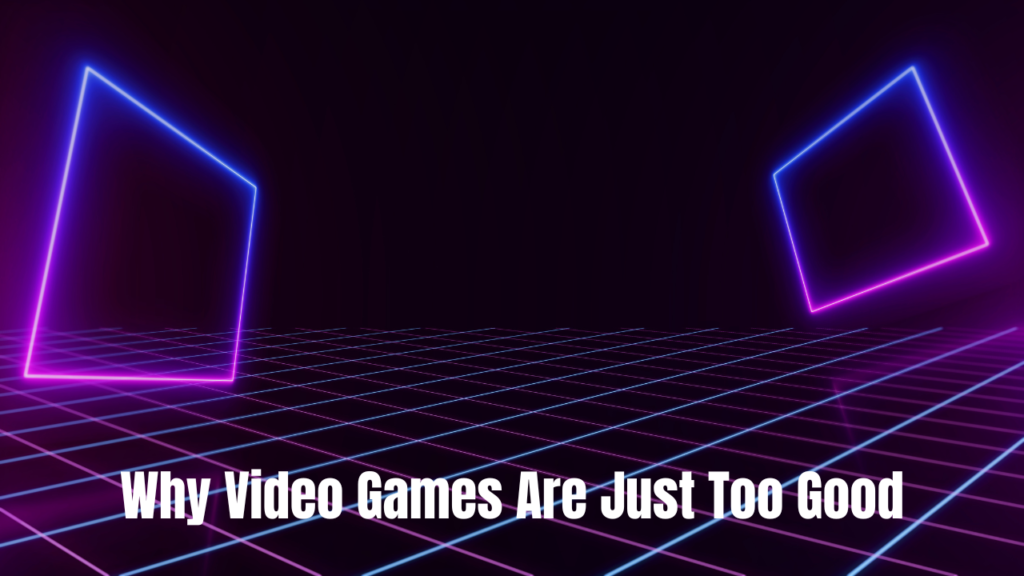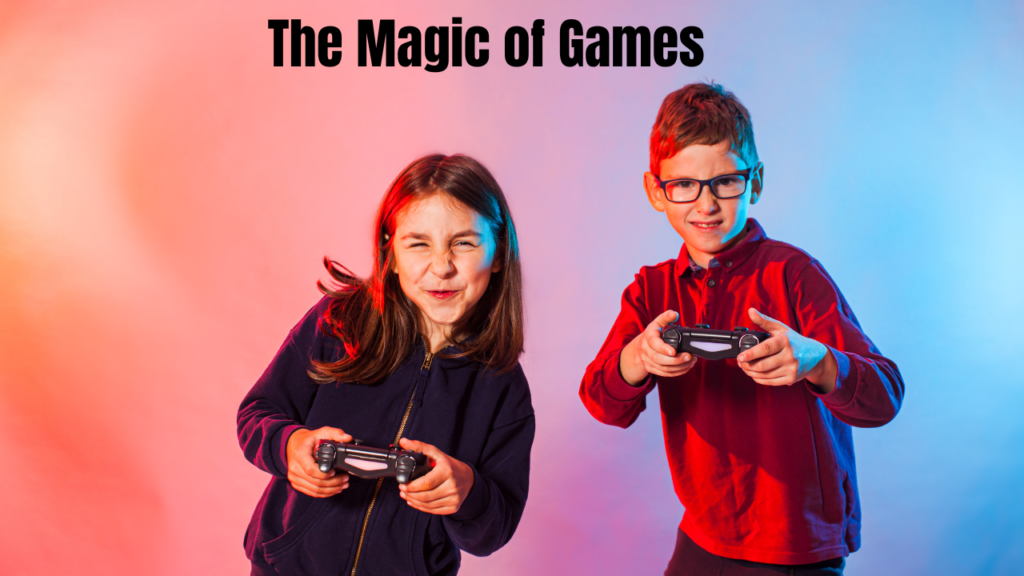Why Video Games Are Just Too Good (And Maybe a Little Too Addictive)
Why Video Games Are Just Too Good: Video games, man. Once you start, you don’t stop. One moment you’re like, “Just one more game,” and next thing you know, it’s 4 AM, your eyes are drier than a desert, and your diet for the past six hours has been chips and caffeine. But hey, no regrets.

Games are everywhere—on your phone, PC, consoles, and heck, even smart fridges now. And they just keep getting better. But why are they so addictive? Why do we keep coming back? And is that a good thing, or are we willingly sinking into digital quicksand?
The Magic of Games (And Why We Can’t Quit)
First off, games are fun. Duh. But it’s not just any fun—it’s the kind of fun where you get to be a space warrior, a medieval knight, or some random dude running from 99 others in a battle royale.
There’s something about games that real life just can’t match. In real life, if you mess up, that’s it. You can’t hit restart on a bad decision (unless you’ve mastered time travel).

But in games? You die, you respawn. You mess up, you reload. It’s the ultimate “do-over” button.
And let’s be real—winning feels good. Whether it’s crushing your friend in a fighting game, getting that final kill in an FPS, or finally beating that one annoying boss that’s been ruining your week, that little dopamine hit? Chef’s kiss.
Games Are Sneaky Smart
People say video games make you dumb. Lies. Absolute lies. Some of the smartest people I know? Gamers.
- Games teach problem-solving, strategy, and patience (sometimes).
- Ever played a game where you sit there thinking for 30 minutes, trying to solve a puzzle? That’s brain work.
- Shooters? You’re not just clicking heads—you’re reacting in milliseconds, predicting enemy moves, and learning maps. That’s skill, my guy.
Honestly, gamers could probably survive an apocalypse with all the strategic thinking and quick reflexes they’ve developed. (Or at least dodge a rogue shopping cart in a parking lot.)
Are Games Lowkey Taking Over Our Lives?
Real talk—gaming can take over your life if you’re not careful. And it happens without you even noticing.
You ever start a game, blink, and suddenly three hours are just… gone? Time? What even is time when you’re gaming? It just melts away.
Then there’s the whole “neglecting real life” thing. Like, when was the last time you drank water? Touched grass? Made eye contact with a human? Sometimes we get so deep into a game that our real-life quests (work, school, relationships) are all waiting for us to remember they exist.
Gaming in moderation? Awesome. Gaming to the point where your sleep schedule is in ruins? Maybe take a step back, champ.
Online Games = The Wild West
Online gaming is a whole different beast. You get the best moments, the funniest stuff, and also some of the most toxic people on the planet.
One second, you’re vibing with your team, and the next, some 12-year-old is screaming at you through their mic. But at the same time, online gaming is crazy fun. You meet people from all over the world. Some? Friends for life. Others? Rage quitters who will never speak to you again.
And don’t even get me started on lag. Nothing makes a gamer angrier than lag. It’s like, “Oh, so now my internet decides to stop working?” Right when I was about to win? Unacceptable.

The Future of Gaming (And Why We’re Not Ready)
Games are evolving at an insane pace. Graphics? Insane. AI? Creepy good. VR? We’re inches away from living in a sci-fi movie.
Imagine 10 years from now—full VR worlds, games that feel real, AI that talks back like an actual person. We’re heading straight for a future where gaming and reality blend.
Will that be cool? Absolutely. Will it be terrifying? Also yes.
How to Balance Gaming and Real Life
Loving games is great, but balance is key. Here’s how to keep gaming fun without letting it take over your life:
How to Balance Gaming and Real Life
Set Time Limits
Use alarms or app timers. You don’t wanna wake up and realize you’ve been gaming for 12 hours straight.
Take Breaks
Stand up, stretch, hydrate. Your spine and eyeballs will thank you.
Prioritize Responsibilities
Get your work, school, or chores done first. Then reward yourself with gaming.
Stay Social (In Real Life Too)
Gaming friends are great, but don’t forget your real-life relationships.
Mix It Up
Try other hobbies. Read a book, go outside, learn a skill. Gaming will still be there when you come back.
FAQs : Why Video Games Are Just Too Good
Q1: How do I know if I’m addicted to gaming?
A: If gaming starts interfering with your daily life (work, school, sleep, relationships), that’s a red flag. If you feel anxious or irritable when you’re not gaming, it might be time to take a break.
Q2: Can gaming actually help my brain?
A: Yep! Many games improve cognitive skills like problem-solving, reaction time, and strategic thinking. Just don’t try using your Call of Duty skills in real life.
Q3: What are some healthy gaming habits?
A: Take breaks, stay hydrated, get enough sleep, and don’t let gaming replace real-world responsibilities. Also, stretch your wrists—carpal tunnel is real.
Q4: Is online gaming making people more toxic?
A: Online gaming has its share of trolls, but it also builds teamwork and social skills. Just mute the toxic people and move on.
Q5: Will video games get even more immersive in the future?
A: Absolutely. With VR, AI, and evolving graphics, the line between gaming and reality is getting thinner every year. Ready Player One vibes incoming.
Final Thoughts (Before I Go Play Another Game)
Gaming is awesome. Maybe too awesome. It’s fun, social, challenging, and one of the best ways to escape reality for a bit.

But remember—eat, sleep, go outside, call your mom. Gaming will always be there, but life? Life keeps moving.
Now, if you’ll excuse me, I gotta go play just one more match.
Aviator Game Download – How to Get Started and Why It’s So Addictive

One Comment